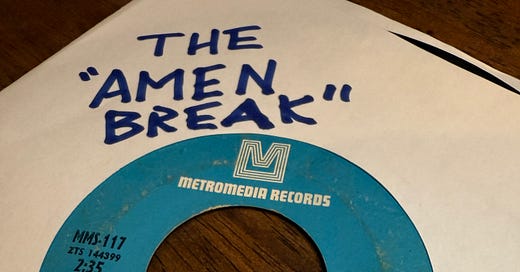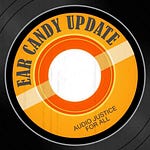On a trip to New Orleans to visit my brother, we stepped into Euclid Records and started digging. The place is a glorious cavern, less than a homerun swing away from the Mighty Mississippi. I walked out with some fun things, some hard-to-find things, but what I managed to put in my hands, for all of 13 bucks, less than the cost of a cocktail in the French Quarter, was the 45 RPM pressing of the most imitated, revered, and stolen record in all of music history, The Winstons’ Amen Brother.
What are the most important six seconds in music history? Not the most important song, or lyric, or even the biggest mistake. I’m talking about six seconds that changed everything. The answer: a drum solo. But not the kind where the drummer tries out for Cirque du Soleil. I mean a four-bar break in a song you probably never heard, by a band you definitely never saw live, tucked away on a B-side that almost everyone ignored—except the guy who pressed the record.
The Winstons: Accidental Architects of Everything
Back in 1969, The Winstons—a funk and soul group from Washington, D.C.—released Amen, Brother. They put it out as the B-side to their hit Color Him Father. Gregory “G.C.” Coleman sat on the drum kit. He didn’t chase fame. He just played drums really, really well.
The Resurrection of the Obscure
For 17 years, Amen, Brother faded into obscurity. Then, in 1986, a record store employee named Break Beat Lenny dug up the record. He added it to his Ultimate Breaks and Beats bootleg series. That’s when history took a turn — not because winners wrote it, but because someone bored enough to dig through old vinyl boxes found a treasure.
The Break That Broke Everything
Why does this matter? Because of those six seconds — the Amen Break. Four bars of drums that sound like the universe is about to start breakdancing. In 1974, DJ Kool Herc invented beat juggling by switching between two copies of the same record. By 1977, Grandmaster Flash took the idea further. By 1987, the E-mu SP-1200 sampler let anyone with a little cash and a lot of attitude loop the Amen Break forever.
Break Beat Lenny even brought in Louis Flores to re-engineer the break and slow it down. That move made the Amen Break the backbone of club tracks, car stereos, and commercials everywhere since the Reagan years.
The Amen Break Goes Global
The Amen Break didn’t stay in hip hop. Like jazz, Coca-Cola, and the idea of “selling out,” it crossed the Atlantic and took over the UK rave scene. Suddenly, the break popped up in breakbeat hardcore, jungle, drum and bass—music that sounds like a robot having a panic attack at 170 beats per minute. By 1991, reggae and ragga influences joined in, and piano melodies showed up, because even machines need a little romance.
The Hip Hop Connection
But hip hop never let go of the Amen Break. You’ll hear it in Dr. Dre’s Straight Outta Compton, in tracks by Tyler the Creator, Jay-Z, Salt-N-Pepa, Lupe Fiasco, Bell Biv DeVoe, The Game, 2 Live Crew, and Eric B. & Rakim. If you ever nodded your head to a song and wondered why it felt so good, you probably owe that feeling to G.C. Coleman’s six seconds of genius. According to whosampled.com, musicians have sampled the track more than 2,400 times (excuse me, 4,500 times as of this posting). That’s either a sign of greatness or proof that musicians love a shortcut.
The Money That Never Came
Here’s the tough part: The Winstons never got paid. In the early days, sampling worked like trick-or-treating — take what you want, no questions asked. Richard Spencer, the band’s frontman, told the BBC that Coleman died penniless. The man behind the most important six seconds in music never saw a dime.
The GoFundMe Epilogue
Eventually, two British DJs — Martyn Webster and Steve Theobald —launched a GoFundMe for the surviving band members. They raised nearly $26,000. It’s heartwarming, but also a little sad, because that’s less than you’d get for a used Honda Civic. The campaign did so well, they started another one. Nothing says “justice” like crowdfunding.
The Moral, If There Is One
So that’s the story: Break Beat Lenny, the dawn of hip hop, and six seconds of drums that changed everything. If you want to understand pop culture, don’t look at the stars. Look at the people who made the stars possible, and then ask why nobody remembers their names.
Because sometimes, the most important thing in the world is the thing you never even noticed.











Share this post